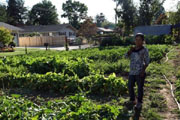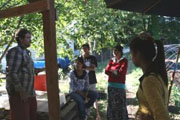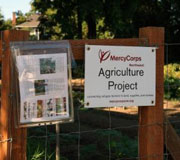-
(单词翻译:双击或拖选)
Farming Helps Refugees Put Down Roots
For refugees, starting over in a new country can feel like landing on a new planet. It’s difficult enough to understand daily life, much less face the challenges of finding a job.
In America’s Pacific Northwest, a program to ease the refugee resettlement experience is helping1 people put down new roots, literally2, through agriculture.
But learning to be an American farmer can be a tough row to hoe.
A few years ago, a small plot in southeast Portland, Oregon, was an empty lot. Now, it’s a densely-planted farm. Tomatoes are ripening4 on the vines and the lemon cucumbers are nice and juicy.
Learning curve
David Beller, the farm’s coordinator5, is not happy with the fields. “Everyone come here, and feel how dry this is. I can’t believe this stuff is even alive.”
The farmers Beller is working with are refugees from Bhutan, a small, landlocked country in the Himalayan highlands, on China’s southern border.
Their translator says, "Oh, they thought that they doesn’t have to put water in.”
 |
| Farmer Pabi Tiwari, who moved to Oregon from a Nepalese refugee camp, enjoys a lemon cucumber fresh from the fields. |
The refugees-turned-farmers arrived in Portland a couple of years ago and are now part of the New American Agriculture Program at MercyCorps Northwest. The group is known for its international development work, but a local division helps people in Washington state and Oregon.
“We started working with refugees, engaging them in urban agriculture in 2004, with the motivation that food is a connector, and there was growing interest in local food," says John Haines, who directs the local program. "And the refugees were coming with motivation, some skills in growing.”
Putting down roots
The idea of small urban plots, where people can earn supplemental income close to their homes, is now a part of refugee resettlement programs all over the country. There are Somali Bantus farming in Boise, Idaho, and refugees from Burundi growing crops in Seattle, Washington.
 |
| Farm program manager David Beller talks to refugee farmers Pabi Tiwari, Guman Bharati, Jumuna Bharati and Pabitra Tiwari. |
When Bal Tiwari moved to Portland from a Nepalese refugee camp, he was excited to have the opportunity to farm again. In fact, he was just glad to discover that America had farms.
“He said that he never thought that he’ll get an opportunity to work in the farm," says the translator who is interpreting for Tiwari. "Because they said that America doesn’t have any kind of agriculture production, and he thought he’ll get all the things from out of country.”
Becoming an American farmer is a big adjustment for refugees. First, they speak very little English, and often have little formal education, which limits their ability to use most training materials. They also have to adapt to a different climate. Back in their home countries, many refugees practiced a casual subsistence agriculture, cultivating fruits and vegetables for their families. Here, they produce a marketable crop on dense3, urban plots.
“For example, these farmers are really into planting beans spaced out farther than I like," farm manager David Beller says. "And they’re convinced that it’s the best way to grow beans, and they’re easier to pick and better quality. And I’m convinced of exactly the opposite. So there’s a healthy tension between different practices.”
Going to market
 |
| Up until a few years ago, this MercyCorps Northwest farm plot in southeast Portland, Oregon, was a vacant lot. |
The learning process doesn’t end at the harvest. MercyCorps staff also teach farmers how to grade their crops for the American market and how to pack it so that it won’t bruise6. The hard work is paying off.
The Portland plots now produce enough vegetables to sell to local farmers’ markets, a few restaurants and members of their Community-Supported Agriculture program. And the benefits go beyond the economic.
“They get some connectivity to the wider community. They’re comfortable getting on a bus going across town, they get comfortable with selling at a market," director John Haines says. "So we find it’s a way to bridge isolation7 as much as provide a modest income.”
And, of course, there are also the edible8 benefits, as a translator relays for Pabi Tiwari. "They are getting the fresh vegetables and the fresh fruits. They don’t have to pay in market. It’s kind of free food and fresh food.”
Although, as Nisha Basnet laments9, it’s not quite as good as back home. "We have a very sour tomato in Nepal, and here it is kind of sweet or something. It doesn't taste good like Nepal.”
The Nepalese farmers hope that they’ll someday be able to get seeds for their native tomatoes and beans, and grow them right here in the Northwest.
 收听单词发音
收听单词发音
1
helping

|
|
| n.食物的一份&adj.帮助人的,辅助的 | |
参考例句: |
|
|
|
2
literally

|
|
| adv.照字面意义,逐字地;确实 | |
参考例句: |
|
|
|
3
dense

|
|
| a.密集的,稠密的,浓密的;密度大的 | |
参考例句: |
|
|
|
4
ripening

|
|
| v.成熟,使熟( ripen的现在分词 );熟化;熟成 | |
参考例句: |
|
|
|
5
coordinator

|
|
| n.协调人 | |
参考例句: |
|
|
|
6
bruise

|
|
| n.青肿,挫伤;伤痕;vt.打青;挫伤 | |
参考例句: |
|
|
|
7
isolation

|
|
| n.隔离,孤立,分解,分离 | |
参考例句: |
|
|
|
8
edible

|
|
| n.食品,食物;adj.可食用的 | |
参考例句: |
|
|
|
9
laments

|
|
| n.悲恸,哀歌,挽歌( lament的名词复数 )v.(为…)哀悼,痛哭,悲伤( lament的第三人称单数 ) | |
参考例句: |
|
|
|















